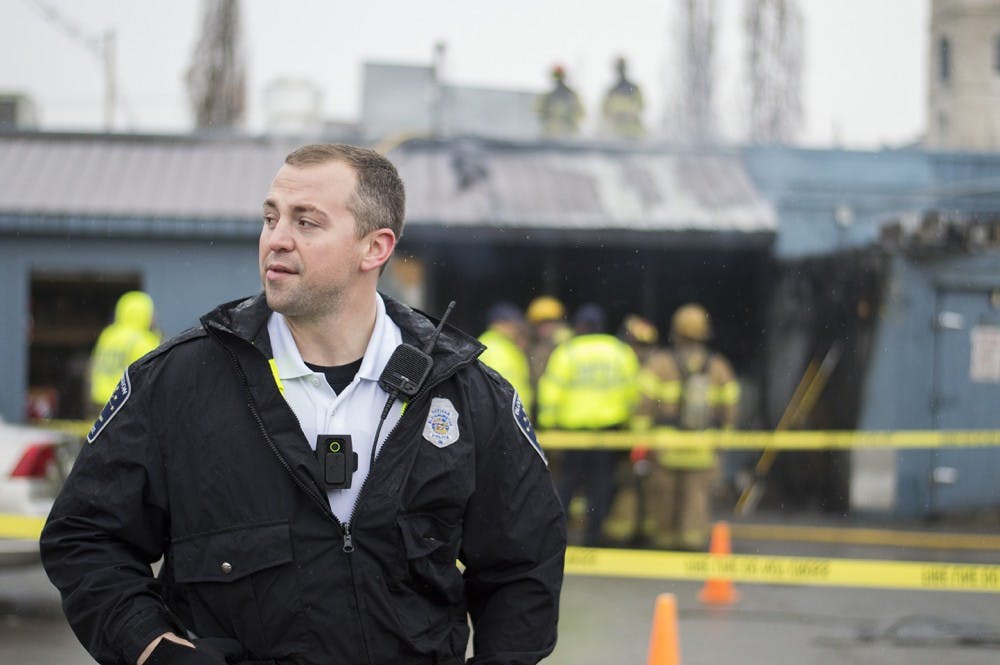The Bloomington Police Department is requesting a budget increase of $1,333,471 for a total of almost $14 million for the 2017 financial year. The budget represents more than a 10 percent increase since 2016 for BPD. A number of those costs are known from previous years, while others are new for 2017.
“Most of those are fixed costs,” BPD Capt. Steve Kellams said. “We know what they cost.”
The largest portion, approximately $11 million of the proposed budget, is devoted to paying salaries for more than 100 officers and another 63 civilian employees and is part of the set of “fixed costs” for the department.
After health and life insurance, additional medical testing and overtime pay, personnel services cover approximately $11.6 million dollars of the budget, another increase from the past year. Medical costs have also increased as a result of President Obama’s Task Force on 21st Century Policing.
The initiative by the president is designed to encourage a robust and “fitter” police force.
Kellams said that other increases are to pay for an assistant supervisor in records and for a part-time evidence clerk.
The part-time clerk would help organize and clear away excess evidence, which Kellams said is a huge problem for the department and its evidence technicians, who do not have time to do it.
“Evidence doesn’t get cleared away,” Kellams said. “It’s a mess down there.”
Evidence like video footage has to be held for 99 years if requested by an individual, and that data begins to pile up, Kellams said.
BPD Chief Michael Diekhoff wrote in the proposal the new supervisor is necessary to help the records division that works around the clock to process requests.
“The records division is in operation 24 hours a day, seven days a week,’ Diekhoff wrote. “This division has one supervisor.”
The assistant supervisor would work with Joan Manning, the current records manager, to help process public access requests, crime logs and other paperwork. The backlog for data requests can be as long as six months.
Manning approves and processes all public access requests. Kellams said whenever she is not on duty, those requests get kicked up the chain to him.
Kellams said an assistant supervisor and part-time evidence clerk would help with evidence backlog and is necessary for BPD to work efficiently.
“They’re absolutely essential,” Kellams said.
Some of the costs for the budget are not necessarily fixed and are subject to alteration, such as vehicle repairs, building and electrical maintenance, uniform costs and what are called “capital outlays.”
One of the biggest changes from 2016 to 2017 is in what are called “capital outlays.” Capital outlays describe money spent to repair, upgrade or maintain assets, buildings and new technology.
While Kellams was unable to give an exact figure, he did say one surprising cost was the uniforms for honor guard members. Every uniform must be carefully form-fitted to the individual, he said.
“They can’t squeeze an index card in there,” Kellams said.
While they have to buy new honor guard uniforms for each individual, equipment like ballistic vests and other tactical gear is readily available and can be used by many officers.
“We don’t have to buy all new gear,” Kellams said. “It’s not like ballistic vests are form-fitted.”
In 2016, only around $200,000 was given for capital outlay, according to budget records. In 2017, BPD will devote $675,000, three times the previous year’s amount. Kellams said a lot of the increase in the budget comes from upkeep and maintenance of technology, building and vehicles.
Diekhoff wrote in the proposal that capital outlays are essential to effectively protect and the community.
“The capital outlays are critical in order for us to continue to deliver on our mission of safeguarding life and property,” Diekhoff wrote.
Compared to other departments in the city, Kellams said the almost 11 percent increase for BPD is reasonable and absolutely needed.
BPD’s budget increase is only 11 percent, compared to 24.4 percent for the Controller’s Office or 81 percent for the Office of the Mayor.
However, the police budget has a much larger overall budget to begin with, at almost $14 million. The Controller’s Office has requested a budget of $1,346,585, and the Office of the Mayor has requested $799,759. So, while their requests show a greater percent of increase, they do not approach the budget for BPD.
Kellams said that the increase in the budget is necessary for BPD and does not even cover everything that the department needs.
“Our 11 percent is very conservative,” Kellams said “It’s not only necessary, but a drop in the bucket, considering our needs.”






